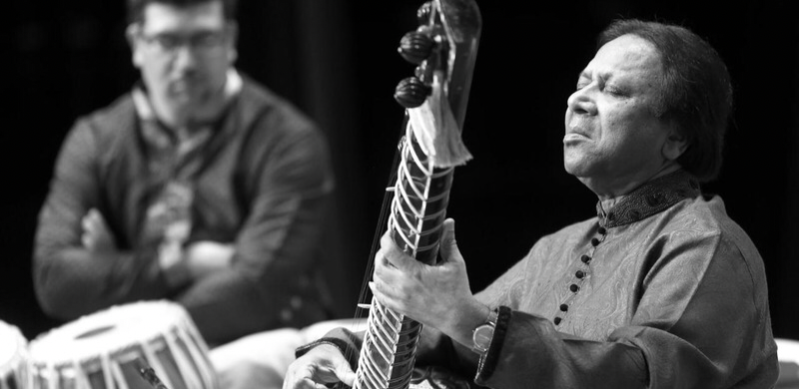
All the characters of the novel are unhappy with their lives. All of them are in search of the true love without knowing what ‘true love’ is. For some, it is money and satisfaction of carnal desires. For some, it is the companionship of a soulmate. Those who had the money and the means to satisfy the carnal desires, are still unhappy. They had set wrong goals. They are running here and there now to find what true love is. But there is nothing like true love and there is true love everywhere. We don’t need the sixth sense to recognize the true love. Even one sense is enough to feel it.
In this excerpt, Qalandar, the main character of the novel, is looking for the true love around and far away from him. He is slightly different from other characters in the novel. He has discovered that music is his true love but the real true love is above the beauty of the twelve notes of sound. He believes the first destination of twelve notes can lead him to his ultimate destination. Among all the characters, only he discovers the truth what true love is and how one can find it.
An Excerpt from Mohammad Shehzad’s Upcoming Novel
Vienna:
Qalandar was in his most favorite city – Vienna – at Wiener Musikverein where Lorin Maazel was conducting a symphony orchestra, guiding more than 100 instrumentalists with his baton. Words, if spoken loudly and clearly could still cause miscommunication. But it was a great display of perfect communication and harmony sans language. A varied group of musicians with unshared origin, culture, language and background had emerged as single voice and one feeling that more than 600 people from different parts of the world could have easily understood. Everybody was in a state of disbelief at the music – Mozart’s Symphony 41, Jupiter. The music expanded and the audience listened with closed eyes in a state of hypnotism. It would be slow for a few moments, then it will become fast, then faster like a storm in ocean. Then it would calm down!
Qalandar’s eyes had brimmed with tears. He was completely lost in the music. He had forgotten everything, even his own existence. What he was capable of remembering was the music. He rediscovered himself when the music had stopped, and applause started. It was a three-minute standing ovation!
Salzburg:
Qalandar was in Salzburg for the sitar recital of Ustad Shahid Parvez. Unbelievably, Parvez would tune his sitar on a note that was not present in the keys of piano. Without the help of a chromatic tuner, he would always tune his sitar with precision between the C# and D. Thus, he could have done a miracle by dividing a half note into two equal notes – one of the strengths of the eastern classical music unimaginable in the western classical music.
As he plucked his sitar’s main string, Qalandar experienced a strong aesthetic chill inside his body. He always believed that there were huge reserves of happiness hidden in his mind that could only be explored by music – not which is very good, not that is excellent but only the one that is outstanding. So far it has been the music of Mozart, Shahid Parvez, the playback singer Mohammad Rafi, the tabla genius Ustad Zakir Hussain, the vocalists like Bade Ghulam Ali Khan, Ustad Amir Khan, Salamat Ali Khan and Kishori Amonkar. They all had gifted Qalandar the endless fortune of happiness and peace.
The very first stroke of Shahid’s sitar had made Qalandar’s spine tingle. He did not shiver in the glacial water of Fuschl but his skin was flooded with goosebumps with the vibrations of his sitar strings. Unlike the Europeans, Qalandar’s body was hairy. He was wearing a half-sleeve shirt and the magical music had raised all the hair. He was far away from pain and miseries. He wanted the music to stop never, for he knew the anguish and agonies would exact revenge on him if it stopped.
His eyes were wide open and not twinkling. He was motionless. The ecstatic chill had frozen him. He was in this state for the last ninety minutes. Shahid Parvez was playing raga rageshri. Qalandar had more than a dozen recordings of the same raga that he had played during the last thirty-five years. Each piece was rageshri yet all were different from each other. This had made the eastern classical music so unique and rich. It was unwritten with endless scope for improvisation.
A practitioner of easter classical music had to be an instant composer. This was not the case in western music. The instrumentalists would read notations to make the music. In Vienna, at the Mozart Festival, more than one hundred instrumentalists under the guidance of one conductor had overwhelmed an audience of 600 people. In Salzburg, the same air had been created but by one artist only. No guide was needed. For the last 90 minutes, he was evoking different soulful feelings with this sitar without repeating any phrase. He could have improvised till the eternity if he wanted so. And listeners like Qalandar would listen. Shahid Parvez in his opinion was another Mozart. He felt as if an ‘Indian Mozart’ was paying homage to the Mozart of Salzburg. And Shahid Parvez had generously admitted publicly that his music was influenced by the playback singer Mohammad Rafi and Mozart besides his uncle’s Ustad Vilayat Khan and the two vocalists – Ustad Amir Khan and Bade Ghulam Ali Khan.
The music lovers of Salzburg gave Ustad Shahid Parvez a standing ovation. Another great memory had been added to Qalandar’s treasure of thoughts. It was very difficult for Qalandar to bid him farewell, but he had to – with a hope to see him again.
